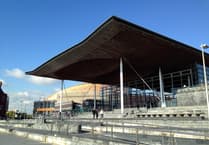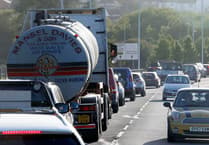You never know where some journeys really begin. I haven’t travelled much in the past 10 years except to Swansea, Cardiff and Peckham, but a chance encounter with a friend in Swansea led me to go to Costa Rica in January for an altogether different life adventure.
From the moment I arrived in the capital, San Jose, my slumbering imagination and senses awakened.
In my younger days all I wanted to do was travel; who knew it would take 60 years to get round to it.
The vibrancy of the people and the colours were overwhelming. I was happier studying the street art than any gallery I have ever been in.
As our group moved round the country, we all had different experiences. I conquered my fear of water vessels by sitting at the front of a six-person dinghy going up the river. Relishing the tranquillity and the extraordinary array of wildlife, cayman, crocodiles, herons and pelicans perched high on trees; the peace broken by the sound and antics of the howler and squirrel monkeys. If you were really lucky you could just about see the shy and elusive sloth.
At such times I temporarily suspended my disbelief in God.
That moment did not last long, as the river meandered towards the sea and where it joined the bay to the beach was littered with old tyres and debris and the debris of mankind.
I concluded that if God did exist, his greatest mistake was creating mankind. Nature can exist very well by itself.
I do not know much about the political background of Costa Rica, but certain observations come to my mind. After the revolution in 1948 Costa Rica became the first country in the world to disband the military and move the financial spend over to health and education – seems sensible.
In the 1820s the government created an industry for all families to be involved with, distributing coffee plants and offering incentives to smallholders. The basis of that industry still remains today.
The government guaranteed world trade links so basically no family was without an income – also seems sensible.
In San Jose, as in most countries throughout the world, the migrant population travelling from Latin to North America can cause concern, but the government took the very sensible approach of allowing migrants to work in Costa Rica.
Life is, however, far from an idyll. Knife crime is high and the difference between the wealth of the large North American owned population and the Costa Ricans is wide.
Costa Rica again leads the way in terms of energy population, harnessing wind energy from turbines high up in the rain forests; geothermal from volcanic activity and hydro electricity from the rivers.
Everything led me to question wealth, poverty and culture.
Capitalism leads to a natural greed for more, bigger, or better; be it a computer, car or home. A home to fill with gadgets and stuff and then more stuff. The socialist life of the Costa Rican led, I think, to a greater happiness. Maybe it is facile and presumptuous to say “poor but happy”.
A typical Costa Rican family lives together, works together. Their homes may have a “make do look” about them but that is because that is the way they have been constricted after centuries of threat of volcanic activity. I am aware that I am simplifying the situation, but I can only describe what I saw.
When I reluctantly came back to Britain and saw people who had so much “stuff” by comparison and with questionable gratitude I realised that all we have is to create our own clutter and our own misery.
Maybe if we cared more about each other and our immediate environment then we too would experience La Pura Vida and the happiness of having less.
On my return I started to declutter and it feels good.



